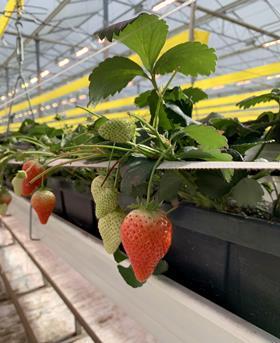
US energy company GE Current is helping UK grower Global Berry offer year-round British strawberries by installing 4,500 of its latest-generation Arize Element L1000 LED top lights in the producer's 30,000m2 Taunton glasshouse.
GE Current says the L1000 lights deliver the optimum light energy required to supplement the available sunlight throughout the day, allowing Global Berry to produce winter strawberries that rival the quality of those picked at the height of summer.
Current worked in partnership with TCE Electrical to create a bespoke lighting design to achieve maximum efficiency and ROI for Global Berry.
Commenting on the light system, John Downes, managing director at Global Berry said: “Current’s team worked with us from day one to build the most effective plan for our operation. We worked with their plant scientists to establish exactly what the strawberry plants would need in terms of supplemental lighting on the darkest English winter days and then once we had the maximum output required and the most suitable light recipe, the designers modelled the exact layout of fixtures required to achieve our production goals with the minimal number of lights.”
Malcolm Yare, horticulture commercial leader at Current commented: “Strawberries are an iconic summer crop that consumers want to be able to buy all year round. Nothing can compare to a homegrown strawberry but with advances in greenhouse lighting and technology you don’t need to wait until the summer months to taste a British strawberry. Global Berry is proving that with the right technology and approach, you can produce berries under glass in the middle of winter that are just as large, sweet and tasty as the fruit you’d pick at the height of summer.”
Downes added: “Securing supplies of high-quality fruit and reducing our reliance on imports in a sustainable way is a key priority for British retailers. By ensuring year-round production of strawberries, we can also provide more reliable, year-round jobs for seasonal workers, consistent quality of produce on the shelves and a more established domestic supply chain for UK consumers with a lower carbon footprint than you’d see from winter imports of berries originating in warmer climates.”



